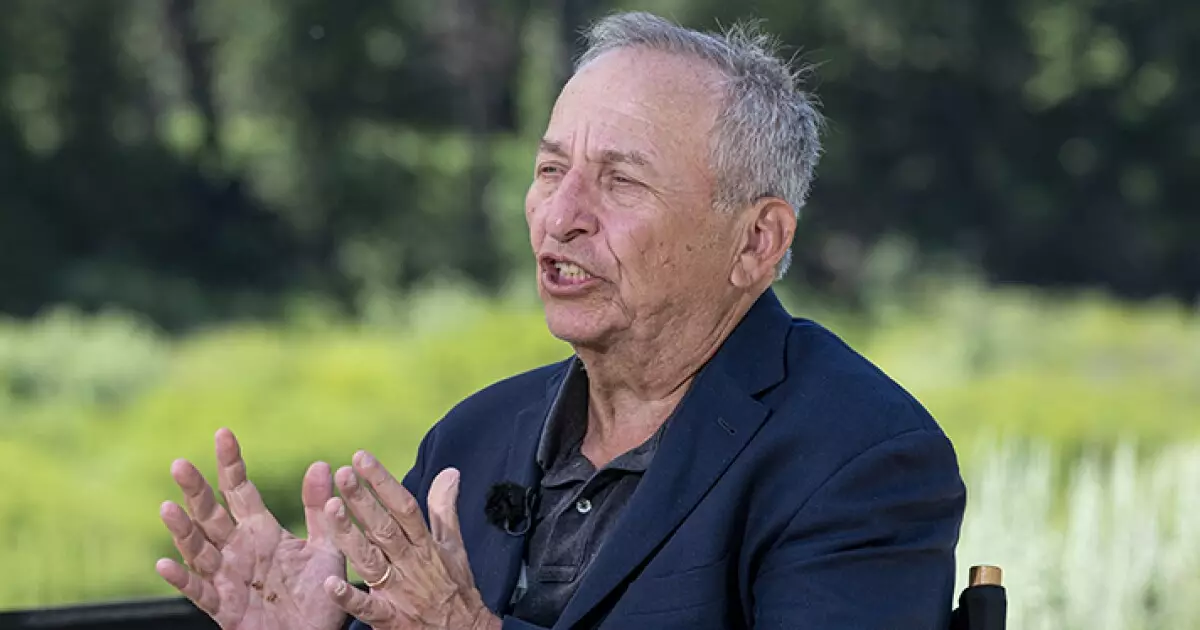As the probability of a new Federal Reserve Chair under the Trump administration looms, one must ponder the implications of such a decision on the nation’s economic policy. Former Treasury Secretary Lawrence Summers has indicated that there is a fair chance Trump could nominate a candidate palatable to both sides of the aisle. However, this notion, while it may stem from a desire for stability in the financial markets, raises questions about whether Trump’s choice will truly reflect an effort towards economic prudence or merely serve as a façade to camouflage his administration’s shortcomings.
The intricacies of the current economic climate dictate a demand for someone genuinely competent. Yet one cannot dismiss the influence of political maneuvering in such a consequential appointment. Trump’s vocal tirades against the current Fed Chair, Jerome Powell, illustrate a leader who is not shy about throwing allies under the bus to shift political blame. Summers suggests that Trump’s insistence on Fed rate cuts may be more about scapegoating for future economic woes than a sincere endeavor to facilitate stimulating economic growth. This reveals a broader strategy to manipulate public perception and responsibility, leaning into populist tendencies that can be detrimental over the long term.
Choosing a “Mainstream” Candidate: An Illusion of Intent?
Summers expresses confidence that Trump will ultimately choose a mainstream candidate, which raises the question: what does “mainstream” even mean under a Trump-led administration? The term could be a euphemism that masks a choice motivated by allegiance rather than economic expertise. Evidence of Trump’s desire to garner populist support is found in his off-the-cuff comments regarding possibly appointing himself—an assertion that, while humorous, highlights a troubling lack of respect for institutional credibility. Is Trump seeking a Fed Chair that can uphold the integrity of the position, or one that simply aligns with his economic vision?
The potential candidates seem to float between establishment figures, like former Fed board member Kevin Warsh and CNBC financial pundit Scott Bessent. Yet their “respectability” can be questionable if their primary goal is to placate a president with erratic economic instincts—one that may be quick to blame external forces rather than take ownership of policy failures.
Economic Forecasts: Beneath the Surface Lies Anxiety
It is crucial to engage with the underlying factors that currently plague the Fed’s economic forecasts. Summers aptly points out the troubling dichotomy wherein inflation is on the rise and unemployment is stagnating simultaneously—a scenario that both parties would find ominous. Past predictions of economic trajectories may indeed be revised, but amidst partisan squabbling, the pursuit of objective economic health is being overshadowed. Trump’s tariffs, while defended as protective measures, are increasingly recognized as contributing to a negative supply shock. In this chaotic environment, the appointment of a politically aligned Fed Chair could exacerbate these already existing problems.
The role of monetary policy cannot be understated in shaping economic outcomes. Trump’s consistent demand for lower interest rates, aimed at easing credit conditions and invigorating consumer spending, could be perceived as a simple measure to sidestep a larger conversation regarding structural reforms that are crucial for long-term stability.
Blame Games and Short-Term Fixes
In a landscape marked by uncertainty, the political implications of the new Fed Chair must be navigated astutely. The tendency of politicians, especially those like Trump, to distract from their own policy failures using the Federal Reserve as a punching bag is a dangerous entanglement. The Fed must maintain its independence, yet the fear of Trump’s populist rhetoric can easily put it under political scrutiny. A Fed Chair sympathetic to Trump’s demands could be more about appeasing an unstable political atmosphere rather than executing sound monetary policy.
In this sense, the responsibility of choosing a competent and independent figure for the head of the Federal Reserve has never been more critical. The financial markets wait with bated breath, and rightly so; if the next appointee cannot navigate the intricate web of economic pressures without succumbing to political influence, then the U.S. economy may be headed down a perilous path. Ultimately, the choice lies not just in selecting a leader for the Fed but in determining the future trajectory of national economic policy amidst a storm of political upheaval and uncertainty.

